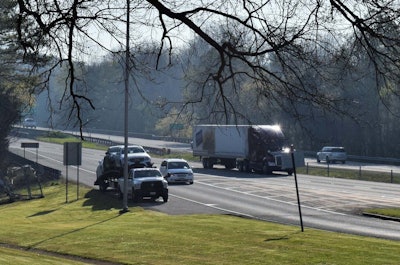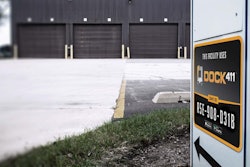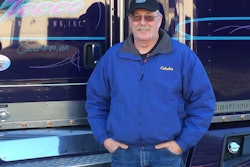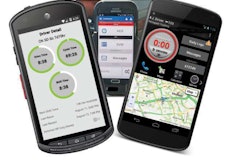 Get in where you fit in? At 9 a.m. on a fairly recent morning at the I-40 rest area serving both EB and WB traffic near one of the Caney Fork River crossings in Middle Tennessee, this hotshot car hauler was one of the several truckers parked along various parts of the get-on/get-off ramps as most primary truck spaces there remained full.
Get in where you fit in? At 9 a.m. on a fairly recent morning at the I-40 rest area serving both EB and WB traffic near one of the Caney Fork River crossings in Middle Tennessee, this hotshot car hauler was one of the several truckers parked along various parts of the get-on/get-off ramps as most primary truck spaces there remained full.I had a brief conversation yesterday with Sergeant Walter Newton of the Delaware State Police’s truck-enforcement unit. The small state contains a section of one of the most high-traffic freight corridors in the nation — I-95. We talked a little about reports I’ve gotten from no small number of owner-operators about an increased difficulty in such high-traffic lanes finding adequate parking, whether adequate planning for it had been done or not.
Sergeant Newton said Delaware is among states that typically do not allow longer-term parking at their two weigh-station facilities along I-95, yet “we do get people that stop by routinely asking if they can park overnight” there, the incidence of which he says hasn’t really increased since the ELD mandate came into play in December. “It’s been about the same as it always was.”
 Have you seen greater parking stresses since the ELD mandate came into play? If you’re reading on a smartphone, tap the image to call and paint the scene for us in a a message on our podcast line with your story. If you’re on a desktop, call 530-408-6423. Make sure to tell us your name and state of residence.
Have you seen greater parking stresses since the ELD mandate came into play? If you’re reading on a smartphone, tap the image to call and paint the scene for us in a a message on our podcast line with your story. If you’re on a desktop, call 530-408-6423. Make sure to tell us your name and state of residence.Newton does believe the turn to ELDs has at the least brought the necessity of finding adequate parking in a timely manner to the forefront of ever more drivers’ planning regimes. “We’ve always had issues with truck parking” in Delaware, he says. Nothing has materially changed there now. What has changed is “people are more aware of it,” the issue extending from an increased prominence among drivers on to enforcement folks like Newton they interact with and on up the chain to federal regulators. The Federal Highway Administration recently announced intentions to take another survey about parking needs as part of its compliance with the Jason’s Law provisions in the 2012 MAP-21 highway bill.

As so many have emphasized, though, and I think most of you would agree, spurring new parking capacity is what is truly needed. This may be a step along the way to that endgame, but let’s not lose site of it.
Sergeant Newton says Delaware scale personnel are fortunate in having large parking facilities (a rest area and a truck stop, respectively) downstream from their scale locations they can at least somewhat reliably point drivers to. That might not help so much, however, at peak times when the facility is full.
If there’s anything that seems sure about parking since the ELD mandate, it’s the expansion, the veritable spreading out earlier in the evening and later in the morning, of those peak times. Our recent polling around parking since the ELD mandate revealed that very few readers (about 6 percent as of this morning’s results) believe nothing has changed. By contrast, a more than 6 in 10 majority have seen peak times expand in the manner described above, echoing Washington State-based owner-operator Tilden Curl when I spoke with him a few weeks back for this podcast, and 8 in 10 readers see the parking situation as having tightened in some fashion.
Where’s your biggest problem area, and how has it changed, if at all, since the mandate went into effect. Dial our podcast line at 530-408-6423 to weigh in or drop a comment below.
A smartphone app alone will not get you to all the way to an ELD
If you’ve been reading Overdrive lo these past couple years, I imagine you’re well aware that smartphone logging apps like KeepTruckin and BigRoad, among many others, utilized without additional hardware capturing ECM data, won’t get you all the way toward an ELD, should you need one in your operation.
If Sergeant Newton is correct, though, there’s still a lot of folks out there who don’t seem to realize this fact. In discussions around ELDs, “our biggest thing is trying to get everybody compliant” who needs to be, he says, and they’re “seeing a lot that aren’t. We’ve been seeing the logging apps” on smartphones a lot, and “drivers who feel they are in compliance, but they’re not connected to the engine.”
Fortunately for some who’ve encountered enforcement in Delaware in such a situation, Newton says his force has been “trying to be helpful in making sure everybody knows what they need” rather than getting particularly stiff on out-of-service orders and the like. That square with what you might have seen?










